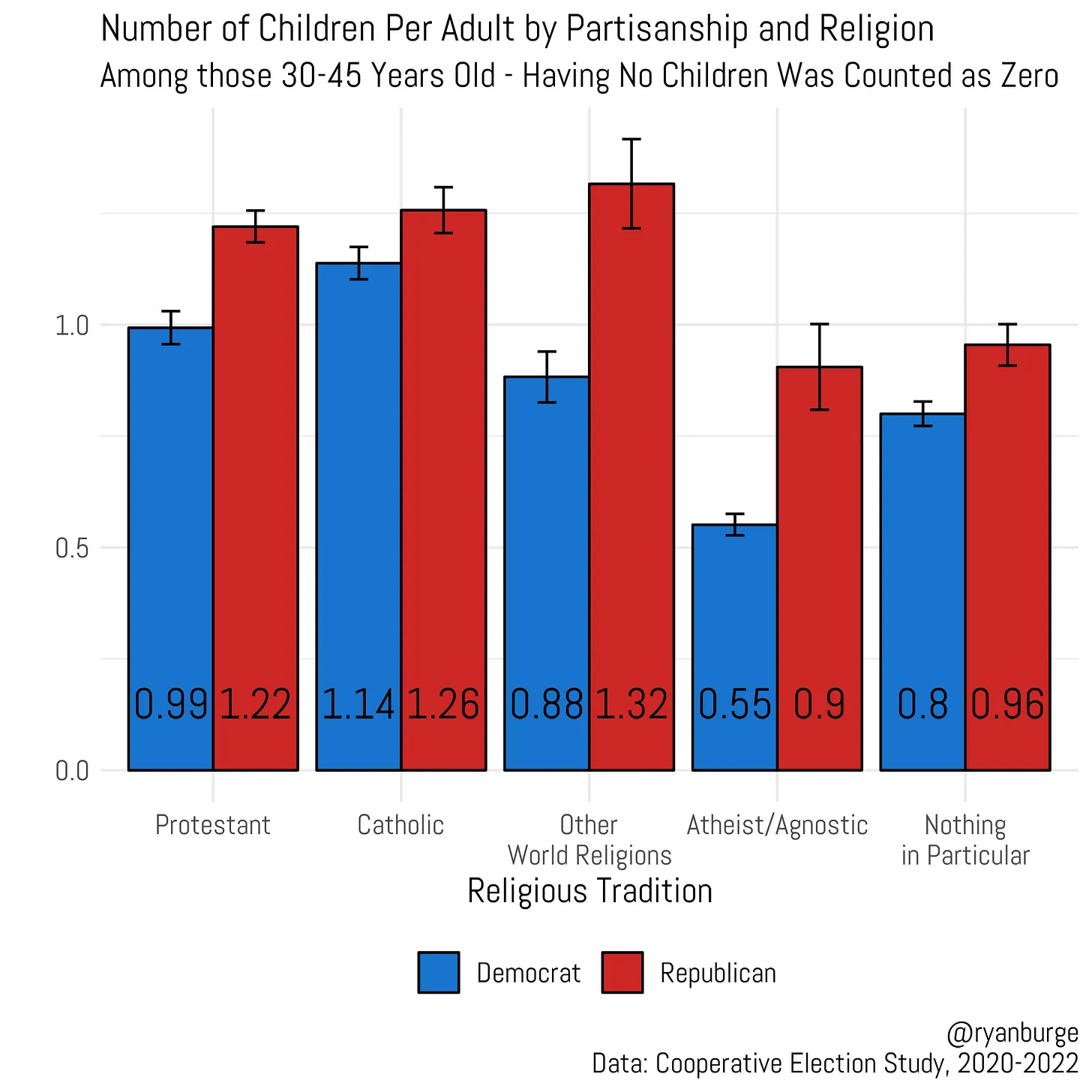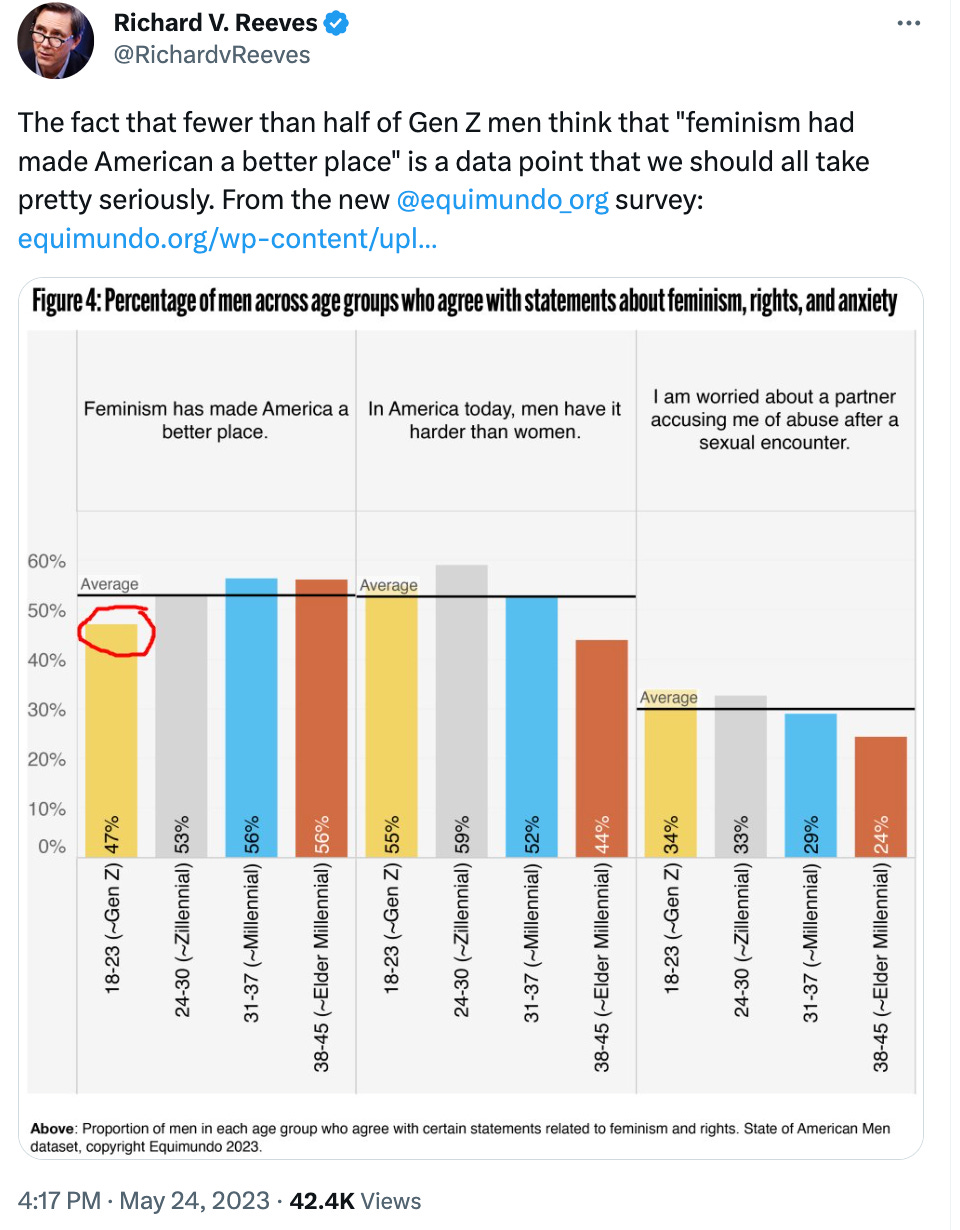Welcome to my weekly digest for May 26, 2023.
For new subscribers, this contains a roundup of my recent writings and podcasts, as well as links to the best articles from around the web this week. You can control what emails you get from me by visiting your account page.
The Price of Pot
I have a piece online over at the Institute for Family Studies about pot legalization and the significant resulting problems hitting the growing number of teenage pot smokers.
What is the impact of this high potency pot on teenagers? Increasingly, psychiatric and other problems. According to a new study from Columbia University researchers, recreational pot use in teens is associated with increased depression and increased suicidal thoughts. It’s also associated with higher levels of truancy and fighting, as well as lower grade point averages.
It’s important to note that this study zeroed in on non-abusive recreational use, excluding people that researchers identified as having a drug problem. As one of the researchers noted, “We were surprised to see that cannabis use had such strong associations to adverse mental health and life outcomes for teens who did not meet the criteria for having a substance use condition.” Researchers noted that teenage brains are not fully mature, and that other studies have shown that teenage pot use interferes with brain development.
Click through to read the whole thing.
Atheists Have Fewer Kids
Religion scholar Ryan Burge had another great tweet thread and Substack post about how atheists have far fewer children than believers. Here’s one of the interesting charts in that piece.
He writes:
Judaism, Christianity, and Islam all encourage their adherents to marry and have children. But lots of Americans don’t adhere to those faiths anymore. I wrote an entire book (actually two of them) about the rising number of Americans who reject religion entirely.
Does this actually matter, though? Do we see in the data a difference in parenting rates for atheists compared to Latter-day Saints, for instance? The answer is: yes, without a shadow of a doubt. Atheists are the least likely to be parents compared to any other religious group and it’s reasonable to infer that some of the drop in American fertility is due to rising secularization.
Even New York Singles Dream of Family
In this month’s cover story in New York magazine, they asked twentysomething single New Yorkers what their ideal life was. Then the magazine calculated how much income it would cost to be able to afford that lifestyle. This paragraph caught my eye:
We decided to put a price tag on the dream lives of a wide range of New Yorkers, all 30 and under and childless. We spoke to dozens of people but narrowed it down to a handful, each reasonably en route to the upper-middle- (and, in two instances, just plain upper-) class life they picture in their heads. We were surprised by how many people fantasize about a life with a partner and kids in brownstone Brooklyn — we expected more to plan lives as single artists or to build households of friends and throuples. We expected a few more to actually want to live in Manhattan. Instead, we heard a craving for high-end domesticity; so many people told us they wanted to be married with “between one and two kids,” a shocking number said they wanted three or more, and nearly everyone said they wanted to own their homes. [emphasis added]
Even hard charging, elite New York singles are hoping for a family.
Best of the Web
Scott Alexander: Much more than you wanted to know about hypergamy - He concludes that there is income but not educational hypergamy (i.e., women marrying up).
NYT: Andrew Tate Thought He Was Above the Law. Romania Proved Him Wrong - This piece suggests that Tate was actually arrested at the behest of the US government.
Pew Research Center: Young adults in the U.S. are reaching key life milestones later than in the past - Reaching milestones later can be a good thing, but sometimes it ends up being too late to reach them.
New Content and Media Mentions
I got a mention in the June issue of First Things, and also in new pieces at the American Conservative and in the Federalist. I was also a guest thing week on the New Founding podcast.
New this week:
Chuck Schumer, Yenta of the Senate. A piece about how Sen. Chuck Schumer likes to play matchmaker and encourage marriages and lots of kids among the piece on his staff.
Women Control Evangelicalism (paid only). A look at how the Josh Butler affair illustrates that, except in mandatory areas of doctrine, women set the boundaries within which the largely male leadership is allowed to operate. This gives them a higher level authority. See also Anthony Bradley’s piece on evangelicalism as matrilineal.
This week on the podcast I look at the question of whether or not the mainline denominations can be revived. Paid subscribers can read the transcript.
You can subscribe to my podcast on Apple, Google, or YouTube.
Post-Script
An interesting tweet from Brookings Institution senior fellow Richard Reeves:





Appreciate the piece on pot, we really need more conservative leaders to come out against this issue to keep it from spreading, and it seems winnable. I have a schizophrenic relative whose mental breakdown may have been triggered at least in part by heavy marijuana use in his late teens and early 20s.
Marijuana legalization is one of those issues where the social left was 100% wrong, and I'm honestly a little surprised how wrong they were. All of the good benefits failed to materialize -- it didn't chase out the black market and its ills, and as a result the tax benefits have come in below expectations. All of the negative consequences were worse than expected. Besides the increased teen use that you highlight, NYC just smells bad, man. I was surprised during a visit around a year ago that even a relatively pricey restaurant stank of weed. Not sure if it was the staff or the clientele (or both), but there must have been multiple people that had just been lighting up all day and reeked of the stuff.
I was also surprised that The Atlantic even wrote a piece last month complaining about NYC's stench (while of course not backing off from the idea that legalization was the right move):
https://www.theatlantic.com/ideas/archive/2023/04/weed-smell-taking-over-new-york/673869/
The dangers of marijuana highlights (again) the need to disconnect from the norms of broader American society. Legal cannot be treated as a proxy for "OK." Any subculture that goes along with American norms is going to be decimated.